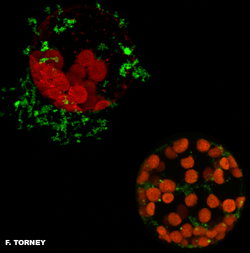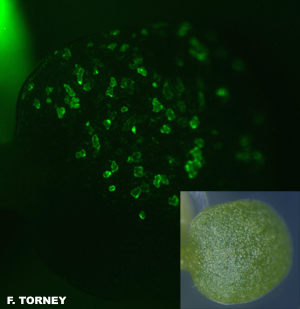Research:
Surface Functionalized Mesoporous Silicate Nanoparticles Mediated Plant Transformation

Collage of tobacco mesophyll protoplast incubated with Type-I MSN that cannot be internalized (top left corner) and tobacco mesophyll protoplast incubated with Type-II MSN that have been internalized (lower right corner)
Plant genetic engineering technologies can only delivery one biogenic specie (nucleic acids for the most part). We used mesoporous silica nanoparticle (MSN) system, with 3 nm sized pores, for delivering both DNA and chemicals into isolated plant cells or intact plant leaves. We successfully:
- Demonstrated internalization of MSN by the plant cell through endocytosis.
- Transiently transformed plant cells by either bombardment or endocytosis.
- Induce gene expression in transgenic plants using MSN to deliver a transgene-inducing chemical under controlled-release conditions.
- Co-delivered plasmid DNA and the transgene-inducing chemical into plant cells and release the encapsulated chemical in a controlled manner to trigger the expression of co-delivered transgene.

GFP expression on tobacco cotyledon after bombardment with Type-III MSN coated with constitutive GFP expression plasmid.


